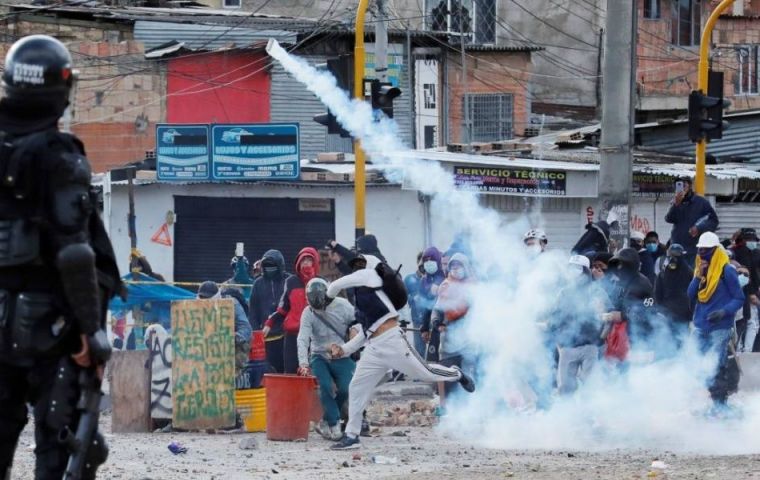MercoPress. South Atlantic News Agency
Violence present in fact and thought all across Colombia over the weekend
 Minister Molano wants people to know the difference between peaceful demonstrations and acts of violence
Minister Molano wants people to know the difference between peaceful demonstrations and acts of violence Violence was present over the weekend all across Colombia either as a factor as a subject of debate.
The LGBTIQ+ community celebrated pride month but mourned their 110 yearly murder victims. The Government announced an anti-vandalism bill and guerrilla-linked killings went on in Cauca.
Scores of colourful crowds marched through the streets of Bogotá, Medellín, Cali, Barranquilla and other Colombian cities to celebrate pride month and defend the rights of the LGBTIQ + community (Lesbian, Gay, Bisexual, Transgender, Intersex and Queer).
Meanwhile, the Colombian government announced that an anti-vandalism bill is to be submitted before the new legislature, which starts July 20. Defense Minister Diego Molano highlighted in a radio interview that the important thing was that such a project “will be debated broadly and democratically” so that society can tell the difference between a “peaceful protest” and sheer destruction.
Marcela Sánchez, Director of the Colombia Diversa foundation, claimed that although some progress had been made, the LGBTIQ + community still suffers some 110 yearly murders. Sánchez complained that more gay people are murdered than trade unionists or journalists and there is a high underreporting of these types of events. “The State does not put the magnifying glass on it. Violence must be prevented. Any type of violence!”
Colombia is nevertheless one of the countries with the most open policies towards homosexuality with no restrictions to marriage, adoption or serving in the military. In November 2015, the Constitutional Court of Colombia approved homosexual adoption and in April 2016 it also approved same-sex marriage. However, complaints related to the violation of these people's rights often come to light.
The anti-vandalism bill came after months of social and political unrest with clashes, strong police repression and an increasing number of deaths at the hands of law enforcement officers. Over 60 people have been killed.
Molano insisted that the destruction of “the public transport system, commercial establishments and in monuments” had nothing to do with peaceful demonstrations and that is where the “anti-vandalism law comes in.”
The marches began for a tax reform which was finally withdrawn, but they grew in intensity against the militarization of the streets, demanding police reform and more help from the State to deal with the economic hardships of the pandemic.
The NGO Human Rights Watch has accused the police of being involved in at least 20 homicides, in 16 of which officers fired their guns with the intention of “killing.”
And Sunday, the Institute for Development and Peace Studies (Indepaz) denounced the murder of three young people in the Colombian department of Cauca in what would be the 47th massacre so far this year.
The Ombudsman's Office has issued an alert and warned of the presence of armed, guerrilla and paramilitary organizations, such as residual GAO factions, the Gaitanista Self-Defense Forces of Colombia (AGC) and the ELN. These murders are added to that of a leader of the indigenous community of the Catrú reservation, in Chocó, Luis Picasso Carampaima, who was beheaded.
Indepaz directly pointed to AGC, an illegal armed organization dedicated to fighting the guerrillas.
The organization explained that with Picasso there are already 84 social leaders assassinated in 2021 and that there is already 1,200 dead since the signing of the peace agreement with the Revolutionary Armed Forces of Colombia (FARC), in 2016.
Both civil organizations such as Indepaz as well as the UN and opposition parties have repeatedly asked the Government of Colombia to provide guarantees to social leaders and demobilized former guerrillas who work in the most remote areas of the country to enforce the agreement.




Top Comments
Disclaimer & comment rulesCommenting for this story is now closed.
If you have a Facebook account, become a fan and comment on our Facebook Page!